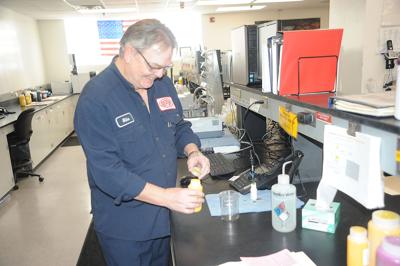For 80 years the DuPont Plant in Fort Madison has remained strong and active, primarily due to its ability to modify and adapt. One such example of this is the recent announcement that the company will be merging with Dow Chemicals.
According to DuPont Plant Manager John Hellige, the official announcement came from the head office Thursday.
“Dow and DuPont will be a merger of equals,” Hellige said. “They are the same size companies and will join to make one company called Dow-DuPont. This is supposed to happen in the third or fourth quarter of 2017.”
Hellige said Dow-DuPont will act as one company for a year and a half.
“The intended final solution is there will be three independent businesses,” Hellige said. “Fort Madison DuPont will be one of those three businesses and it has yet to be named. Right now it is being called ‘Specialty Co.’”
Hellige said this will have no effect on the number of employees or the products manufactured in Fort Madison.
“Only the name will change,” Hellige said. “In fact, our site will look exactly the same. We are not going to change our signage or uniforms. Everything will look exactly the same here. It’s pretty much a non-issue for the site.”
Changing with the times
DuPont is no stranger to making adjustments. The first adjustment made was when the plant moved from Mooar to Fort Madison.
“Originally the plant was built by Perfection Tire prior to 1917,” Hellige said. “The intention was to produce tires for Ford and other vehicles.”
Hellige said prior to 1920 the plant was left idle and stayed that way for 20 years.
“At the same time there was a DuPont plant in Mooar/Powdertown that made black powder,” Hellige said. “That plant was in production from 1902 to 1952. DuPont was looking for a midwest location to make thinners and resins for the automotive industry.”
Hellige said the Mooar plant worked with the Fort Madison Chamber of Commerce to purchase the Perfection Tire plant.
“They began retrofitting the plant to begin making thinners and resins for the automotive industry,” Hellige said.
Hellige said the one thing DuPont prides itself on is the ability to reinvent itself.
“We can develop a product, see it through its maturity and decline,” Hellige said. “That product will leave the site and we are able to adapt our equipment in our square footage to the next initiative that DuPont has. We’ve gone from paint and paint thinner, to resins, automotive paints, and residential house paints. And now we are in the most recent new life in the plant since the early 1990s; ink for the digital printing market.”
Today’s products
Hellige said most of the DuPont business in Fort Madison centers on digital printer ink that is used in small office and home office printers.
“We also do textile ink that is used in a variety of things like artwork on t-shirts, upholstery, drapery ... anything that can be printed on fabric we produce the ink for it.”
Hellige said DuPont also produces ink for network and commercial printers.
“That can be anything from printers as large as my office, putting out mail printings and textbooks on demand for universities, or wood laminate flooring,” Hellige said. “There is just a wide variety of things. That’s probably the majority of our business right now, ink jet.”
The main process in the facility is known as dispersion.
“What we really have a knack for here is something we call dispersion technology,” Hellige said. “We send products to another DuPont site that become backsheets for solar panels,” Hellige said.
Hellige said DuPont makes other dispersions called Nomex that are used in fabrics for military uniforms, firefighters and police uniforms.
“We have a lot of large tanks left over from the paint days,” Hellige said. “Anything you can mix in a tank and grind ... we are in the market for those new businesses.”
Hellige said there is no concern about the ink jet business dying off.
“We like to find a model that has not reached its maturity yet and this is it,” Hellige said.
A generational business
“The thing about this company is it is generational,” Hellige said. “In the past 80 years, we’ve become deep-rooted in the community. Most people in this area either know someone who worked here or have family that worked here. It’s really one of the greatest things about working here.”
In the beginning the plant had about 300 people working there, but now there are 72. Hellige said the company also prides itself on a safe working environment indicating it’s been 1,300 days since the last injury. There is a major emphasis on safety. It has been over 3 and a half years since an accident has happened.
“We want to make sure everyone goes home the same way they came to work,” Hellige said.






